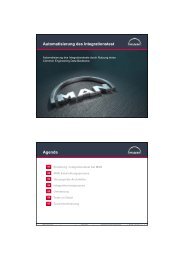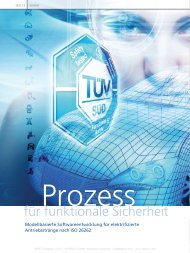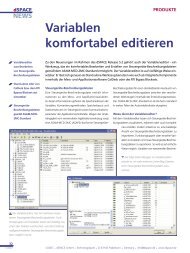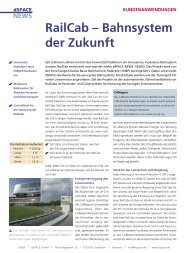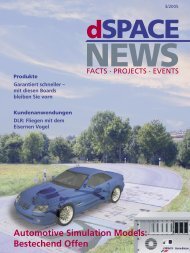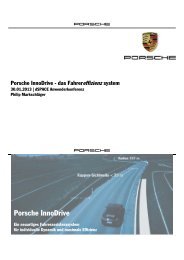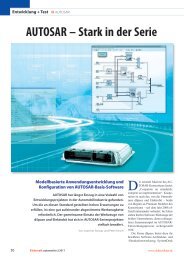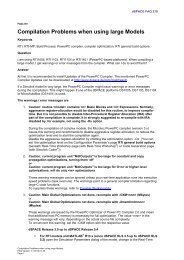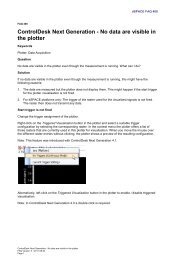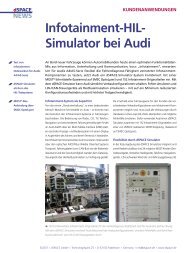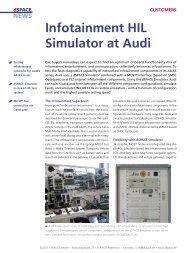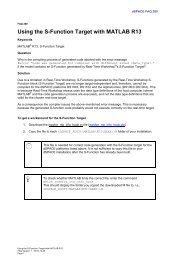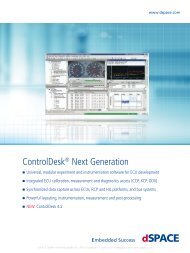You also want an ePaper? Increase the reach of your titles
YUMPU automatically turns print PDFs into web optimized ePapers that Google loves.
FAQ 211<br />
<strong>Avoiding</strong> <strong>Task</strong> <strong>Overrun</strong> <strong>Errors</strong><br />
Keywords<br />
RTI; RTI-MP; Build Process<br />
Question<br />
<strong>Avoiding</strong> <strong>Task</strong> <strong>Overrun</strong> <strong>Errors</strong><br />
FAQ Version: 1 / 2010-12-29<br />
Page 1<br />
<strong>dSPACE</strong> FAQ 211<br />
My model does not run in real-time and stops with overrun errors. What can I do to avoid this, how can<br />
I decrease the turnaround time of my model?<br />
Solution<br />
There does not exist a unique solution to avoid overrun situations that applies for all models. But some<br />
general hints can be given that might help to decrease the turnaround time and to improve the<br />
efficiency of the generated code:<br />
Make use of the Multiple Timer <strong>Task</strong> Mode. Model parts that need not necessarily be<br />
calculated with the fixed-step size of the model (i.e. the fastest timer-driven task) should be<br />
assigned to a slower task.<br />
Detailed information about this topic can be found in the RTI and RTI-MP Implementation<br />
Guide, chapter Handling <strong>Task</strong>s > Timer <strong>Task</strong>s.<br />
Avoid using unnecessary blocks, especially if these blocks are fed with vector or matrix<br />
signals.<br />
For example, a Gain block which is driven by an FFT-signal with 1024 elements results in<br />
1024 multiplications and needs memory for 1024 double values.<br />
Avoid using the Math Function Block.<br />
For example, do not use the ‘pow’ function to calculate powers of integer values, but use<br />
Product blocks instead.<br />
Only use the option 'Saturate on integer overflow’ if it is really necessary. This option can be<br />
selected for several Simulink blocks (Gain, Sum,...). Turning this option off results in more<br />
efficient code.<br />
Making use of atomic subsystems with option 'RTW system code’ set to ‘Function’ has an<br />
influence on the turnaround time. In general, the actual influence of the option cannot be<br />
foreseen. Especially in case of very large models, generating atomic subsystem code into<br />
separate functions makes it possible to use a higher optimization level for compilation.<br />
See FAQ 210 for details about how to reduce the model size or complexity.<br />
Since MATLAB R13, the 'Reusable Function' option exists for atomic subsystems. Using this<br />
option might also have a positive influence on the efficiency of the generated code.<br />
As far as possible, (atomic) subsystems should only contain blocks that are calculated with the<br />
same sample-time. As a result, the generated code contains less calls to 'ssIsSampleHit' or<br />
'rtmIsSampleHit'. More information about this topic can be found in the Real-Time Workshop<br />
User’s Guide, chapter Program Architecture: Model Execution.<br />
The options 'Inline Parameters', 'Signal Storage Reuse', 'Inline Invariant Signals', 'Local Block<br />
Outputs', 'Buffer Reuse', 'Expression Folding' and 'Conditional input branch execution' (since<br />
MATLAB R13) which can be found in the Simulation Parameters/Configurations Parameters<br />
dialog may have a positive influence on the turnaround time.
<strong>Avoiding</strong> <strong>Task</strong> <strong>Overrun</strong> <strong>Errors</strong><br />
FAQ Version: 1 / 2010-12-29<br />
Page 2<br />
If ‘Signal storage reuse’ is activated, some block output signals are missing in<br />
ControlDesk’s variable browser. For more information, see FAQ 019.<br />
<strong>dSPACE</strong> FAQ 211<br />
If ‘Inline Parameters’ is turned on, only selected block parameters are available in the<br />
trace file.<br />
If 'Conditional input branch execution' is set, different parts of the application will not be<br />
calculated and could lead to misinterpretation of the results<br />
You will find more information on how to optimize the generated code in the Real-Time Workshop<br />
User’s Guide, chapter Optimizing a Model for Code Generation.<br />
Excerpt:<br />
Related FAQs<br />
Run ‘slupdate’ on old models.<br />
Directly inline C code S-functions into the generated code by writing a TLC file for the Sfunction.<br />
Use a Simulink data type other than double when possible.<br />
Remove repeated values in lookup table data.<br />
Use the Merge block to merge the output of function-call subsystems.<br />
Look-Up Tables and Polynomials: Simulink provides several blocks that allow approximation<br />
of functions. These include blocks that perform direct, interpolated and cubic spline lookup<br />
table operations, and a polynomial evaluation block. (…) Each type of lookup table block has<br />
its own set of options and associated trade-offs.<br />
You can achieve large performance gains on most processors by identifying those portions of<br />
your block diagram that are really integer calculations (such as accumulators), and<br />
implementing them with integer data types. Floating-point DSP targets are an obvious<br />
exception to this rule.<br />
If your model contains Stateflow blocks, select the Use Strong Data Typing with Simulink I/O<br />
check box (on the Chart Properties dialog box) on a chart-by-chart basis.<br />
Some of the techniques described in the Real-Time Workshop User’s Guide are not<br />
supported by RTI:<br />
Specifying -DREAL_T=float after make_rtw in the Make command edit field in the<br />
Simulation parameters dialog must NOT be done if the model is built for a<br />
<strong>dSPACE</strong> system. This would lead to memory corruptions because several RTLib<br />
functions only work for data type double.<br />
RTI does not support the option 'Block Reduction'.<br />
FAQ 210 Compilation Problems when using large Models
How to Contact <strong>dSPACE</strong> Support<br />
<strong>dSPACE</strong> GmbH<br />
Rathenaustr. 26<br />
D-33102 Paderborn<br />
Germany<br />
++49 5251 1638-941<br />
mailto:support@dspace.de<br />
http://www.dspace.com/support<br />
<strong>Avoiding</strong> <strong>Task</strong> <strong>Overrun</strong> <strong>Errors</strong><br />
FAQ Version: 1 / 2010-12-29<br />
Page 3<br />
<strong>dSPACE</strong> FAQ 211<br />
<strong>dSPACE</strong> recommends that you use the support request form on the internet to contact<br />
<strong>dSPACE</strong> support.<br />
It is available under<br />
http://www.dspace.com/goto?supportrequest<br />
Software Updates and Patches<br />
FAQ<br />
<strong>dSPACE</strong> strongly recommends that you download and install the most recent patches for your<br />
current <strong>dSPACE</strong> installation. Visit http://www.dspace.com/goto?patches for software updates<br />
and patches.<br />
FAQ documents are available under http://www.dspace.com/goto?faq.<br />
Important Notice<br />
This document contains proprietary information that is protected by copyright. All rights are<br />
reserved. Neither the documentation nor software may be copied, photocopied, reproduced,<br />
translated, or reduced to any electronic medium or machine-readable form, in whole or in part,<br />
without the prior written consent of <strong>dSPACE</strong> GmbH.<br />
© Copyright 2010 by:<br />
<strong>dSPACE</strong> GmbH<br />
Rathenaustr. 26<br />
D-33102 Paderborn<br />
Germany<br />
This publication and the contents hereof are subject to change without notice.<br />
For a list of registered trademarks of <strong>dSPACE</strong> products refer to<br />
http://www.dspace.com/goto?Trademarks



